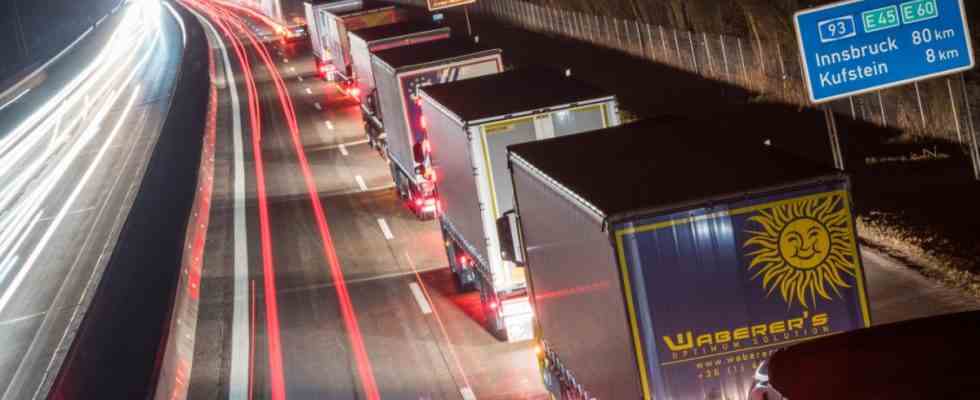On Monday morning it was 28 kilometers again, two more than a week earlier, and again the backlog of trucks extended beyond the Inntal triangle to the A 8. At the other end of the line, at the motorway border crossing between Kiefersfelden and Kufstein, the Tyrolean from 5 a.m., directly after their weekend and night driving ban for transit trucks, only 100 trucks per hour allowed into the country, later 300. For the drivers, for their clients, for the residents and commuters in the Bavarian Inn Valley and also for the traffic politicians in Munich and Berlin these Tyrolean block handlings are a constant nuisance. Now the digital allocation of passage rights across the Alps should bring a solution.
The heads of government of Tyrol and the two Italian provinces of South Tyrol and Trento had already spoken out in favor of such a solution at the beginning of the year, citing a feasibility study commissioned by the South Tyroleans. Most recently, Bavaria’s Transport Minister Christian Bernreiter (CSU) and his new Tyrolean counterpart René Zumtobel (SPÖ) discussed it.
According to a joint statement, both ministers hope that a slot system will bring about “effective improvements” in the transit of the Brenner Pass, both for residents living on the heavily used route and for the economy, which depends on the smoothest possible transport of goods. A working group at official level already meets regularly. There will soon be a top meeting of representatives from Bavaria, Tyrol and South Tyrol. After that, according to Zumtobel, “convincing work has to be done with the respective federal governments in Berlin, Vienna and Rome”.
The slot planning brought into play by South Tyrol is based on a digital booking system that can be used to reserve a specific period of time for each individual truck journey across the Alps. Similar systems exist, for example, for handling at large container terminals or for take-off and landing rights at airports. When crossing the Brenner Pass, the system is intended to smooth out traffic and make it smoother.
Because according to the study, congestion usually occurs during the day at certain peak times, when passenger traffic meets all the trucks that are not allowed to drive through Tyrol at night. The ban on driving at night and also the restrictions for certain goods and for trucks with poorer emission classes remain unaffected by the slot system, the study continues. Because they were not used to control traffic, but to protect the health of local residents. Charging fees for the individual slots is not permitted due to European regulations.
The economy doubts the feasibility
At least that calms the economy and especially the freight forwarders, who have so far mainly expressed concerns about increasing administrative costs and decreasing flexibility as well as doubts about the practical feasibility of the plans. As far as the waiver of additional fees is concerned, the proposed slot system differs from a Europe-wide “Alpine Crossing Exchange” as has been advocated for many years by various environmental protection associations. On such an exchange, transalpine transit rights could be auctioned and traded, which would only make sense if they were a scarce commodity.
As soon as the slot system should go into detail politically at some point, this could ignite a new dispute between Bavaria and Tyrol. Because the Tyroleans are primarily interested in significantly reducing the number of around 2.5 million transit trucks on the Brenner route, while Bavaria, in the interests of its export-dependent economy, has always insisted on the freest possible travel for all trucks and has repeatedly put an end to it who called for restrictions.
Despite all the confidence shown on both sides of the border: the road to an agreement on the transit issue is long, as Bavaria’s Minister of Transport admits. And even if Bavaria, Tyrol and South Tyrol should at some point agree on a slot system in detail: only the respective federal governments could introduce it by means of a state treaty.

